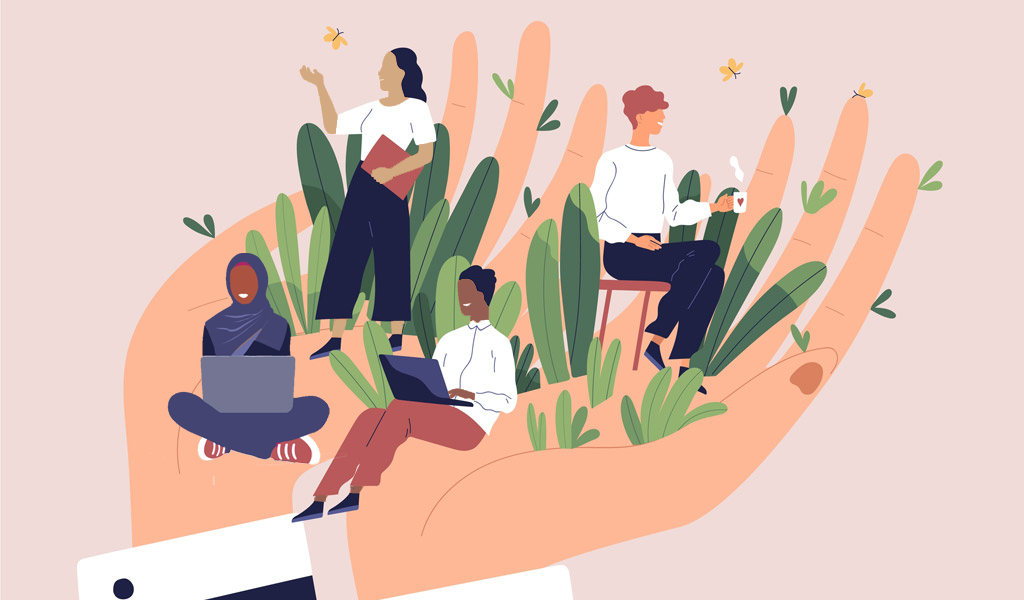A basic psychological need everyone has is belongingness. We all want to feel like we belong, are understood, and are a part of something bigger. Our world is a diverse one in regard to cultural traditions and ideas, how we identify in terms of who we are, what we are to others, what we practice, and more. Having these differences should be a highlight, not a divide or a wedge, in our lives and when communicating with others. This is particularly true and important in our working environment. To feel belongingness at work means that we feel we are a part of something greater than ourselves, that we not only respect and value but that we are respected and valued back. Having this need requires a culture of belonging.
It was a great pleasure to have Alida Miranda-Wolf join me on my podcast. Alida is the author of Cultures of Belonging – Building Inclusive Organizations That Last, as well as the founder and CEO of Ethos, a full-service Diversity, equity, inclusion, and Belonging transformation firm. She is deeply committed to teaching, love, scaling empathy, and healing harm through diversity, equity, inclusion, and belonging strategies.
Alida and I discussed her book, as well as the work she does around creating cultures of belonging in the workplace, what it means to create a culture of belonging, why it’s important for leaders and organizations to do, and how to do it.
Alida began our conversation by stating her multiple identities. She said that is where the book starts and is also where her “life and diversity, equity, inclusion and belonging begins, too.” I was struck by the fact that in many of the different spaces that Alida is in, she is a leader. In her book, she lays out guiding tenants that shape her work as a leader. I spoke with Alida about them, along with the principles that came from them and the importance of creating a culture of belonging.
Here are a few of the topics we touched on that stuck with me:
Leaders are expected to be experts
As leaders, we are expected to commit to DEI and belonging and be experts on how to achieve them. In doing that, we have to know what that is, accept that we are held accountable to know what it is and that we will put it into practice in our workplace. In my own experience, in working with leaders and organizations, there is the idea of leaders feeling like they do not know what they are talking about but yet are expected to still lead. This, in turn, becomes a real source of fear for the leaders. Alida’s response to this is spot on. She says, “the first thing that I’ll start with is the reality, which is this wasn’t always true. You weren’t always expected to be an expert in diversity, equity, inclusion, and belonging. That has been, depending on the kind of leader you are and the kind of organization that you’re part of, a recent development.” She also pointed out that being expected to be experts is not from her point of view; it is from the people you lead, your employees. She goes on to say that being a leader is being able to practice behaviors that set forth a foundation to foster a healthy working environment. Because leaders know how to establish that already, as that is their daily job, they can then put practices and processes in place at work. Instead of leaders thinking about the idea of being an expert, Alida points out that it’s easier to, “Set practices in place and processes in place that help create more balance between advantage and disadvantage. Make sure that you’re asking the people coming from various identities how they feel when they’re in the space together, and that value and respect are core in terms of honoring and recognizing the human experience and what makes somebody a person.” To me, this is a very spacious approach to being an expert, which gives leaders the room to continue to learn and grow, just as they want their employees to.
To be intentional about our culture will produce belonging
Alida talks about how “We tend to associate culture and belonging with one another because what we’re really trying to talk about is an ideal of culture or a healthy culture, but ultimately, belonging is a product of a group.” When we have groups of people that are different, we must be intentional about the culture to produce belonging and produce the sense of what Alida calls the “3 R’s.” — Relationships, Resources, and Reciprocity.
Belonging requires strong relationships with people in the group. If there are not those types of relationships or having any relationship to/with something, it is not possible to feel a part of something greater than ourselves. Resources, for Alida, means energy, and if you are using your energy to protect yourself at work, it is challenging to feel a sense of belonging, and you cannot have strong relationships with people when the resources of energy are not there to pull from. Finally, reciprocity in terms of do you value and respect your workplace? Does your workplace value and respect you? It is the give and take, or mutuality, that contributes to ones belonging feeling that they are getting back what they are putting in.
Understand your “why”
Leaders must have a clear definition of what belonging is to both themselves and their employees and why it is important. To have different meanings will cause conflict and misunderstandings, which does and will not foster a sense of belonging. As Alida says, “understanding is critical to developing the processes and practices that allow for us to achieve organizational alignment and clarity,” and to “ultimately go beyond acceptance and appreciation of one another.”
Introduce change slowly
If the change to becoming an inclusive and culturally belonging organization is done too quickly, it will be rejected. How Alida puts it is perfect. “There’s only so much change that we can handle within a given institution or system, and we’re not mind readers, so we often aren’t able to detect resistance until we’re in the thick of it. So, if we’re moving in an incremental and paced way, we can make sure to listen, to stop, to check in, to evaluate whether things are working, whether we’re losing things that matter.” I can identify with that as I know if change is introduced slowly and at a tolerable pace, it allows for adjustments and listening to occur so that you can assess how the organization is responding and continue to move forward
Safety is our most basic human need
Alida says in her book that “Belonging, self-actualization, or any higher order of needs cannot exist unless people feel safe” This struck me as if we do not feel safe, and are biologically in protection mode, we cannot connect with others. I am reminded about Alida’s 3 R’s that we need to have in a culture of belonging when we talked about this. If we cannot connect with others, we do not have those relationships When we are focused on protecting ourselves, we do not have the resources we need to pull from to foster relationships. And, finally, one cannot be reciprocal if they feel the need to protect themselves, or will not feel protected in their environment. Not having the feeling of safety makes it impossible to create a culture of belonging.
The importance of investing in a culture of belonging
Alida notes that if a leader truly cares about their people, then they will/do also care about creating a culture of belonging because they want their people to be socially well. If people feel they belong, they feel they have someone to reach out to for help. If they do not, they feel alone. When leaders care about their people, how they work together and show up, leaders will want to foster that feeling of knowing they can go to someone for help.
Alida and I also discussed other principles and tenants from her book, Cultures of Belonging – Building Inclusive Organizations That Last, She writes about creating a culture of belonging in such a practical and applicable way. I am so thankful that she wrote this book which is so accessible, useful, and impactful. Listen to the whole podcast with Alida Miranda-Wolf here.

